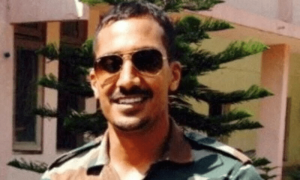The Gujarati language is facing an uncertain future in this country, to put it mildly. At least its written form is in danger of a slow death. Although a living and vibrant language in India, Gujarati is suffering from an apparent indifference from the very people who speak it as their native language in Pakistan.
A recent decision by the National Database and Registration Authority sums up the plight this language now finds itself in. Nadra has omitted Gujarati from the column asking the applicant about his mother tongue.
Interestingly enough, both Quaid-i-Azam Mohammad Ali Jinnah and Mohandas Karamchand Gandhi spoke Gujarati. Mr Jinnah, by the way, knew Persian as well because his mother spoke the language.
Spoken by over 50 million people, Gujarati is the 26th most widely spoken language in the world. The majority of native speakers of Gujarati lives in the Indian state of Gujarat. Apart from Gujarat, the regions where the language is spoken as first language include some area of Maharashtra (like Mumbai), Pakistan (especially Karachi), Bangladesh, a few African countries — where Gujarati-speaking Indians had settled centuries ago — and, of course, countries where Gujarati-speaking immigrants live in large numbers, such as the United Kingdom and the United States.
A branch of the Indo-Aryan family of languages, Gujarati evolved from Sanskrit and Prakrit, according to linguists. But modern Gujarati took shape in the early 19th century. It has its own script that has evolved from Sanskrit and Hindi scripts and many letters in the Gujarati alphabet are almost like the ones in Hindi’s Devanagari script. However, the Gujarati script does not have a horizontal line that is put above every word in Hindi.
The Gujarati literature’s oldest written record dates back to the 17th century. But it was Alexander Kinloch Forbes, a British officer and scholar in the government of British India, who gave a fillip to the language and literature of Gujarati by encouraging local writers.
Forbes was instrumental in getting the first Gujarati play written, the first Gujarati newspaper and literary magazine published. He also established a library in Surat in 1850 and Gujarati Sabha in Mumbai in 1865.
The number of Gujarati speakers in Pakistan is declining fast and one of the reasons is that the new generation of Gujarati-speaking does not use it. The few who do so speak it strictly within the family or community. Since most of the youth, the descendants of Gujarati-speaking communities, cannot read the script, Gujarati-language publications in Pakistan face an imminent death.
Gujarati is spoken in Pakistan by those who migrated from present-day India after the creation of this country. Some of the communities that had settled here before 1947 and did not migrate to India after Partition, still speak Gujarati. The communities that still speak Gujarati are the Bohras, Parsis, Hindus, Ismailis, Kutchi Memon and Kathiawari Memon. They are mainly settled in Karachi, adding colour to the city’s multi-lingual, multi-ethnic scene.
Although a minority language in Pakistan, Gujarati is the official language of India’s Gujarat state, where Hindi is the “additional official language”.
Many senior citizens would recall that Gujarati was taught at many schools in Karachi. There used to be Gujarati-medium schools and students were allowed to use it as the medium of answer in secondary and higher secondary examinations. Special arrangements were made to assess such answer scripts. This was in vogue from independence till the early 1970s, when schools were nationalised.
In those days Gujarati journalism in Karachi was doing well. At least two daily news papers, Millat and Dawn Gujarati, were brought out from this city. In addition, there used to be an evening newspaper, Vatan.
Daily Millat and Vatan are still alive, but face a bleak future as the number of readers is falling steadily .
‘Millat’, launched by Fakhr Matri in 1948, added a few pages in Urdu about 20 years ago to win over younger readers, but the experiment does not seem to have paid off.
A few Gujarati magazines, too, appeared from this city till the 1990s. Newspapers, magazines and books were imported from India and some of them enjoyed immense popularity.
For instance, many people (this writer among them) would recall that their elders used to read Chakram and Chitralekha, magazines imported form Indian Gujarat. These were very popular among Gujaratis in India and Pakistan. N.J. Golibar, the editor of Chakram, was a well-known figure among Gujaratis of Karachi back in the 1960s. Some columnists of Chitralekha were household names.
Mushaeras
Gujarati ‘mushaeras’ were a regular feature in Karachi. And attendance at such events used to be good. But with the passage of time, all this seems a distant memory.
The second generation of Gujarati-speaking migrants from India, who settled in Karachi, knew Gujarati and were able to read and write it.
The later generations, however, lost interest in this language as they did not see any prospect while the Urdu and English languages offered lucrative jobs and were useful in education as well as for everyday communication in society.
Nowadays only the elderly read and write Gujarati while most of the younger ones (young only in a relative sense) cannot even speak it fluently.
The loss of a language is indeed a matter of concern — not for linguists or anthropologists alone but also for anyone interested in culture.
Published in Dawn, January 20th, 2017














































